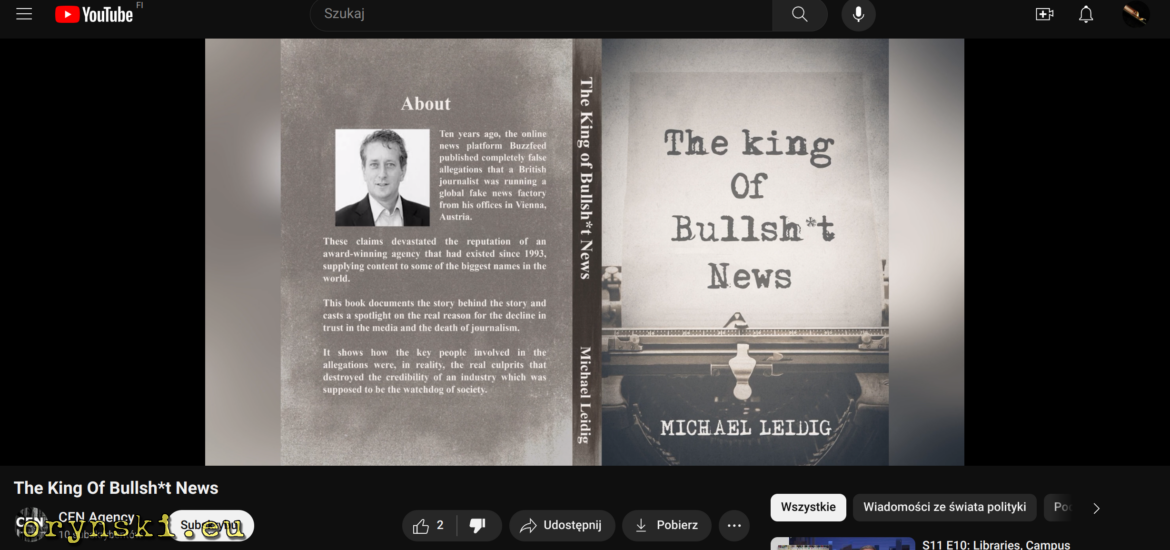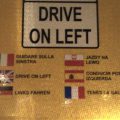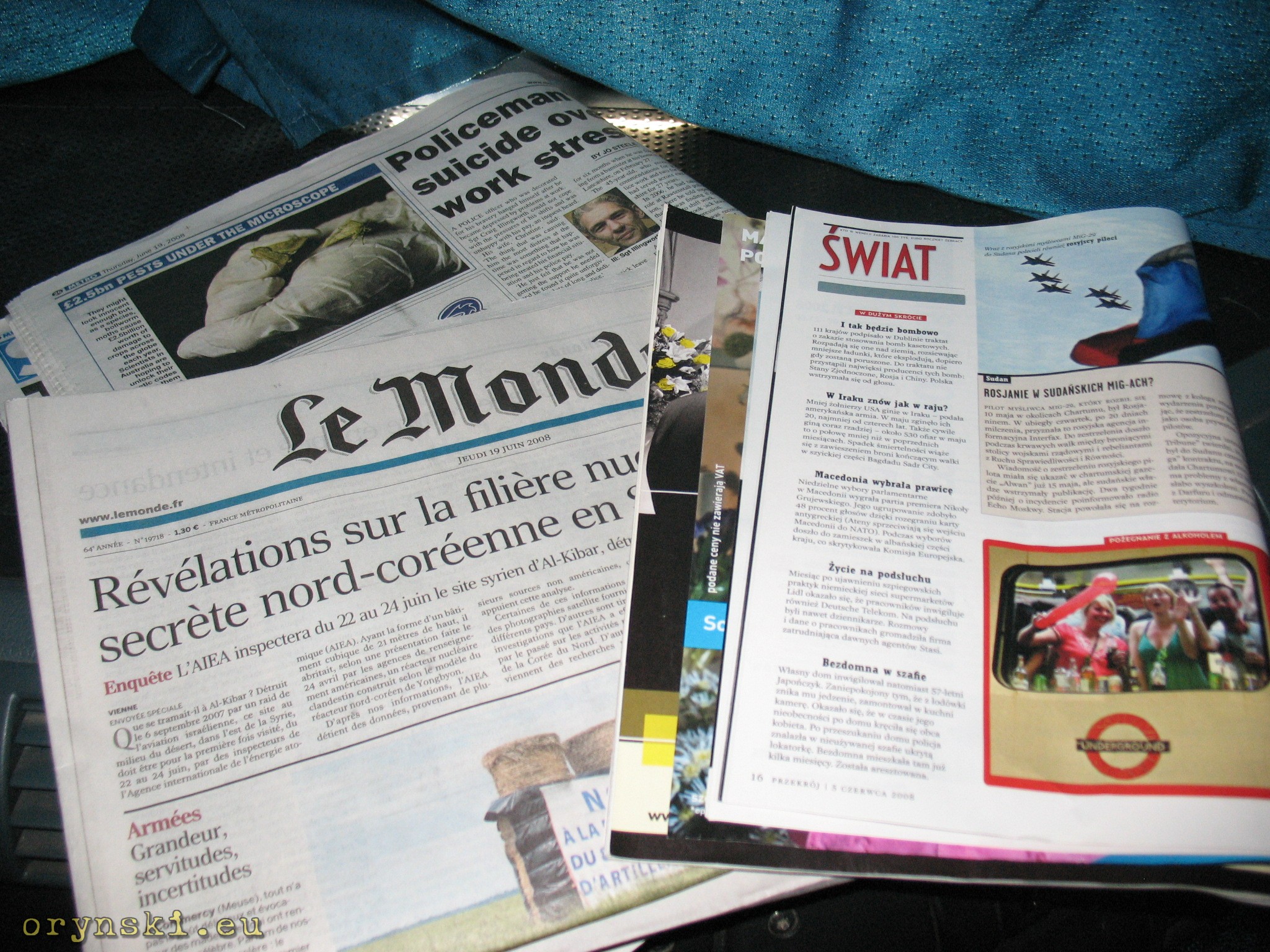Some of my long-time readers might be familiar with the campaign, which involved Gazetae.com, a portal I used to be a deputy editor of, in which we were trying to tackle misinformation and deliberate slandering of Eastern Europe by the British media. One of the most famous cases was a story published by Daily Mail, Daily Record, Huffington Post and many other British media outlets, that was provided to them by Central European News, an independent news agency located in Austria and run by Michael Leidig. Our portal played a small role in debunking this story as being utterly made up.
More than a year later Michael Leidig had been named by Buzzfeed News as the “King of bullshit news” in their famous article, and he sued them for slander but lost the legal battle. We all thought this was the end of it, but apparently, it was not for him, as he just published a book about it – or rather, if I understand him correctly, his journalist investigation into some kind of Buzzfeed-led conspiracy against him. As he “risen from the death” on social media, I tried to challenge him for some dishonesty in his Twitter posts advertising his work, but after a short exchange in private, he refused to further speak with me until I read his book. He even kindly proposed to send me a copy, but an audiobook version available on YouTube was more convenient.
Over the last two weeks, I listened to it in the car – some chapters more than once, as I was not able to make notes while driving – and here is my honest review. But before we start: a disclaimer: this is not just an ordinary book review, as I happen to have some insider’s knowledge that allows me to see the claims made by Mr Leidig against the wider backdrop.
Let’s read
The book starts with 10-minute-long rant about how mr Leidig is a great journalist, and how evil and unprofessional Buzzfeed is. It is so cringy that I almost gave up at this point. At one point told myself “If this crap won’t end before I reach my destination, I am giving up here.” Luckily for Mr Leidig, due to an unexpected late April snowstorm, there was a car crash on Helsinki’s ring road and I was caught in a traffic jam.
Mr Leidig likes to lecture us from his high horse. He says, for example, that a journalist should not approach a topic without a set thesis. Does he do it in his “investigation” into Buzzfeed? And, isn’t it hypocrisy from his point when he criticizes former Buzzfeed employees for writing about the legal battle between Buzzfeed and himself and says it’s not professional journalism, yet he wrote a whole book about the topic in which – for obvious reasons – he just cannot be fair and impartial?
On a side note: he also accused me that I am an “activist” – because I could not remain indifferent to the harm his work has done to innocent people and – answering their pledge – acted on their behalf and took the story to the British press ombudsman (those outlets that haven’t took the story down after the shit hit the fan were forced to publish clarifications). But if I am an activist for reporting on the story and THEN helping its victims, what would that make of Mr Leidig, who wrote a whole book about the guys he lost his legal battle with?
The first half of the book is basically Mr Leidig ranting about how Buzzfeed is an evil corporation that knows shit about journalism. It is clearly an attempt to use “poison the well”. Mr Leidig thinks that if he portrays Buzzfeed as “naive”, “greedy”, “unprofessional”, or “megalomaniac” (he uses a lot of similar adjectives, I haven’t noted all of them down as I am listening to his book while driving), the reader will be more inclined to disregard what Buzffed accuses his news agency of. This is a common logical fallacy: even if Buzzfeed was the most evil entity on earth and had bad intentions, the information that they published about Mr Leidig’s enterprise could be true. Sure, we can discuss what their intentions were, but the bottom line of the whole issue is “Has Mr Leidig’s agency manufactured fake news or not?”. If he did, it would be true regardless of if Buzzfeed was the first one to write about it.
Discrepancies
I could not notice some discrepancies in his stories here. In Mr Leidig’s book on some occasions, Buzzfeed is portrayed as some gigantic, evil corporation (in comparison to his small, humble enterprise). In other paragraphs, Buzzfeed is nothing but just a bunch of amateurs not worthy of being called journalists, as they only share silly memes online, so they don’t even deserve to polish the shoes of the CEN, a respectable news agency with multiple awards, that would never go as low as to purvey silly viral meme stories. And yet, in another paragraph he lets us know that Buzzfeed was amongst his customers and laments, that they weren’t interested in his serious investigations in some human trafficking case, but were taking his silly viral stories about a pink kitten or something instead.
Make your mind, Mr Leidig, what Buzzfeed is: a huge corporation capable of squishing you under their feet at a whim? A bunch of naive kids whose only advantage is that they know how to promote their stuff on Social media? A media outlet that operates in the field of silly memes, which is completely separate from the domain of serious journalism CEN was active on? Or your direct competitor both in the field of silly stories and serious investigative journalism? And suppose they were so big and financially successful and you were so small and humble. Why would they risk everything to try and destroy you, especially if you – obviously not interested in purveying silly viral stories about kittens – weren’t even their competitor?
According to Mr Leidig, Buzzfeed came up with the idea of sponsoring genuine journalism with the money generated from silly stories and memes that were going viral over the internet. While I share many concerns Mr Leidig expresses about contemporary journalism and the situation on the media market, and can stand behind his criticism of certain aspects of Buzzfeed operations (such as undisclosed advertisements) I fail to see how it would be a bad idea to try to fund proper reporting from silly memes if the model would be viable financially, as long as the “serious” reporting would be clearly separated from other operations (which it was, Buzfeed News was a separate website with completely different content to the generic Buzzfeed site). Moreover, judging from the kind of stories CEN managed to publish over the years if what Mr Leidig says is true that he wanted to do more investigative journalism, it is pretty clear that his business plan was similar: sell a lot of stories about kittens, Drunken Santa’s crashing sledges, or teenagers doing silly things, then use the money earned this way to fund some proper journalism focusing on important matters.
Buzzfeed vs Leidig: who really won the struggle?
According to Mr Leidig, Buzzfeed’s business plan collapsed as his multi-million slander case against them has driven investors away. I don’t have any knowledge about Buzzfeed’s financial operation (and I suspect Mr Leidig’s level of knowledge in that matter would be rather limited as well), but I can’t refrain from thinking he is pointing it out in a desperate attempt to put a positive spin on the fact, that he sued Buzzfeed and lost, and lost badly. Of course, he would not acknowledge it, he won’t even mention the outcome of his case for the first couple of times he mentions it, and when he finally does, he tries to muddle it into some procedural mumbo jumbo and then jumps straight into arguing “it’s not really relevant because I brought Buzzfeed down anyway”. In his eyes, he was David fighting Goliath, and while Goliath might have won the battle, by even taking part it in the giant sealed his defeat in the war. As a Polish person, this largely reminds me of a situation from a few years ago when Beata Szydło’s government lost an important vote in the European Union 27:1 but her party continued to claim victory, saying they retained higher moral ground.
But honestly, even if Giant has been wounded (and it’s a big if), I don’t think it has been defeated. Surely Buzfeed plans to expand their European operations never materialized, but as I just checked, both Buzfeed and Buzfeed news sites are pretty active, with Buzzfeed’s Twitter profile having a following of 6 million. None of that can be said about both CEN’s website (which, honestly, looks just like a temporary placeholder) and their social media presence. CEN’s profile on Facebook has only 7 likes and followers, but if you look at the news items they tried to promote there, it’s no wonder why: “Oldest man alive launches new selfie career”, “Man filmed model girlfriend dangling from the balcony before she fell for her death”, “couple getting frisky on a jet ski”, “Turkish woman shares eerie selfie moments before fatal plane crash” are just a few of the most recent headlines featured there. As a side note: this does not really corroborate Mr Leidig’s claim that CEN – unlike Buzzfeed – focuses on real journalism and stories that matter. (Note: while this was true when I wrote those words, the CEN Facebook page has currently only one post, advertising Mr Leidig’s book.)
Manipulations and imputing bad intentions
Speaking of the quality of reporting. Mr Leidig’s accusations of Buzzfeed intentions are not really well documented in his book. He quotes cherry-picked fragments of Buzzfeed employees’ testimonies, and then suggests their intention with his own voice. I am sorry, but this does not hold water. When someone says “We were aware that publishing something can destroy that person’s reputation”, it does not really equate to “our plan was to destroy that person’s reputation, so we made up stuff about him and published it”. This is really sloppy journalism, Mr Leidig. Or perhaps when you wrote that book you had a certain agenda from the start and just tried to piece the bricks together to support it, exactly as you said a good journalist should NOT do?
It is also significant, and this is especially visible in the audiobook version of the book, which I listened to, that Mr Leidig does not treat his adversaries fairly. In his video promoting the book, which he posted on Twitter, he speaks from his high horse and asks the question “HAVE WE SPOKEN TO THE SOURCE” with the giant letters printed across the screen. But did Mr Leidig speak to the source when writing his book? Apparently not.
The other side of the story is mostly represented with quotes from testimonies given by Buzzfeed employees (in the audiobook version of “King of Bullshit News”, Mr Leidig even went as far as using the actual recordings of their sworn testimonies) which is unfair on three levels.
♦ Firstly – with a body of hours and hours of recordings, one could easily cherry-pick fragments that would help to support his claims.
♦ Secondly – he uses those recordings to put them in bad lights. There are several paragraphs where he openly mocks them for being unable to recall this or that. But everyone who ever watched any court drama knows that the answer “I don’t recall” does not necessarily mean they are admitting they had no idea what they were doing: they might be using this as a legal tactic
♦ Thirdly – we don’t hear Mr Leidig’s voice taken from the testimony. His point of view is laid with his own voice. This gives him an unfair advantage: his opponent’s words are taken from their witness deposition, when they were under stress, spoke under oath and had to be very careful when choosing the exact words, as there was no way to take them back. It is especially noticeable in the audiobook version, as of course for further dramatic effect he hasn’t bothered to edit out the pauses, repetitions and demands to clarify the question asked by Mr Leidig’s representative.
Who by the way – as I had experienced first hand as I also happened to give a witness deposition in Mr Leidig’s vs Buzzfeed case – can be pretty aggressive and often instead of asking questions related to the case aims at character assassination: when I was giving my deposition about the Santa story (more on that below), as far as I can recall the only questions Mr Leidig’s lawyer asked me were about how much money I make from my freelance work – in order to undermine my credibility as a journalist (which, I think, backfired, as I remain on the fringes of the media market by choice, and I simply provided an answer to the effect that I could probably make more money if I wanted to work for media outlets such as Mr Leidig’s, but I have some respect to myself).
All this while Mr Leidig’s version of the story was written in the comfort of his home, well after the case had been finished when he was able to edit and polish every single sentence he wrote for however long he wanted until it finally came out in the form he would be satisfied with.
And the choice to read quotes from the actual article in a deliberately squeaky and clownish voice is so low, that I can’t even bother to comment on that, apart from mentioning his book was a bit cringe to listen to even without this. As Mr Leidig regularly returns to remind us how great of a journalist he is and how bad at journalism his opponents were, the choice of contemptuous adjectives he uses to describe Buzzfeed employees compared to the pompous words he uses to describe himself could only be topped if he decided to add a soundtrack and accompanied the latter with angelic choirs singing uplifting, sublime melodies and the former with Imperial March from Star Wars soundtrack.
Ok, but what about Buzzfeed’s accusations?
As for the man being accused of fabricating the news for profit, Mr Leidig writes surprisingly little in his book to defend himself. His line of defence about the stories that WERE proven to be false is basically shifting the blame on someone down the chain. And while going to great lengths to quote cherry-picked, yet boringly long fragments of deposition of the Buzzfeed employees, I can’t recall a single quote from any of the reporters working for Mr Leidig in the book. The only quotes he gives are stories about his friends and business partners calling him to praise his alleged journalistic integrity. He provides very little insight into how his operation works unless we listen carefully to his ranting about how Buzzfeed does not do original reporting but just picks the stories from the net, as when he addresses the histories Buzzfeed accused him of being fake, he admits that his agency does basically the same, and even in the examples he himself provided he admits they did not manage to contact the original heroes of the stories mentioned. Yet when it comes to Buzzfeed, the fact that they did not manage to contact those people either, leads to yet another part with over-lengthy fragments taken from the deposition when his lawyer sarcastically asks Buzzfeed employees if they heard about the fact that there are phones in China.
So basically, based on the examples provided by Mr Leidig the only advantage of CEN over Buzzfeed is, allegedly, that he has some employees that speak the local language (but if the job they are doing is basically lifting stories from other media outlets, one could sarcastically ask if Mr Leidig heard about the fact that google translate exists).
Mr Leidig’s picking apart the methods of Buzzfeed does little to convince the reader he is NOT the king of bullshit news: at best one could lean towards the conclusion that Buzzfeed was indeed his competitor in that field. But when he examines Buzzfeed methods in details, it is merely yet another attempt to poison the well. Meanwhile, I hoped to learn about how CEN works, I would like to know how many of Mr Leidig’s 30 employees speak foreign languages, and what languages they are, for example. I would like to hear in detail how they managed to cover a story happening halfway across the globe with more details than anyone else, including local media outlets, especially if – by Mr Leidig’s own admission – they weren’t able to contact the people involved. I am curious to know how much time they have to work on the story and if they were capable able to delivering dozens of stories to their customers every day. And what serious journalism CEN provided to its customers, as apart from crazy viral stories about two-headed goats, pink-dyed kittens and kids walking cabbages around there are very few examples of something one could call “serious” journalism.
The remainder of the book is pretty much all the same:
– slagging Buzzfeed for their alleged poor journalistic standards and giving cherry-picked examples from their employees’ deposition.
– praising his own superior journalistic qualities (without giving any examples, apart from a couple of mentions of some investigation into the human trafficking case).
There is an elephant in this room
So let’s now talk about the elephant in the room: the Drunken Santa story. Mr Leidig assures us about his highest journalist standards and claims this was never challenged (36:10 into his audiobook, available on YouTube), although he very cleverly phrases his sentence so he could not be accused of outright lying. Because if he claimed explicite “none of our stories was ever questioned”, he would be instantly caught red-handed.
The news items used as examples by Buzzfeed in their original article might be indeed not investigated deeply and the evidence might be largely circumstantial – although pretty believable for everyone who knows how media operate – but there was at least one case where Mr Leidig’s news item had been debunked in detail and showed to be utterly made up beyond any reasonable doubt – and that was about 15 months before Buzzfeed published the article that gave the title to his book.
And what we know about CEN actions in this particular case fits perfectly into the scheme described by Buzzfeed:
1. finding a news item on a foreign news portal (a road traffic accident involving a horse-drawn sledge and a man dressed as Santa).
– using the pictures from this story (without either their author’s or the publisher’s permission – which I happened to check personally by speaking to the photographer and representative of the station that published that original story) and rewriting adding some details to make it more clickable: in CEN’s version of the story the Santa was drunk, and as the story was happening in Poland, this was destined to be a hit, as British media like Daily Mail would drool at every story adding to their confirmation bias about Polish people being irresponsible drunkards and generally uncivilised savages.
– sprinkling it up with some made-up quotes, involving some catchy English language puns.
Except this time Mr Leidig’s agency operated too close to home. While their stories from China or other far away countries might slip the public attention, as for British readers those are, to paraphrase the classic “far away countries of which we know nothing”, the large Polish diaspora in Britain picked up on Santa the story instantly and their outrage filtered back to Poland. A local journalist Martyna Sokołowska investigated the story on location and uncovered that apart from the part that there was indeed a road traffic accident, everything else was made up, including the quotes that were put into the mouths of real people – including the police spokeswoman, or even some seemingly made up witnesses. You can read the English translation of Martyna’s coverage, published with her permission at my blog here. The case was also extensively covered by other media, including major Polish daily Gazeta Wyborcza.
Buzzfeed – with the help of yours truly – went to Poland to cover the story’s aftermath – as this bunch of lies going viral shattered the lives of the main characters, who (unlike some people quoted by CEN) were real people, and deeply divided the community of a small mountain town. You can read Alan’s White reportage here.
Has Mr Leidig ever denied that the Santa Story was made up? To my knowledge, not. Has he sued Buzzfeed, Gazeta Wyborcza or Martyna Sokołowska for their articles showing exactly and in great detail how his news agency lied about real people and made money on made-up news items? Also not.
Why would that be, that Mr Leidig went to such great lengths to sue Buzzfeed about the article that talks about some vague, undocumented stories happening on the other side of the planet that are nearly impossible to prove or disprove without sending a team of reporters across the globe, and have not decided to go the “easier” route and simply proving that the Santa story is true?
It would be very easy for him: he would just have to call his Polish reporter on whose work the Drunk Santa story was based as a witness and provide the authorised quotes of the people his reporter spoke with (by the Polish press law, the reporter has to seek authorisation before publishing someone’s quotes). He never did this, and he refuses to discuss the Santa story even in private. I leave you to make your own guesses why.
My takeaway
So what is my takeaway from Mr Leidig’s book? Is he The King of Bullshit News?
I believe he is, at least in a sense. Why?
Because the Santa story was the biggest bullshit news item I have encountered in nearly 20 years of my work as a freelance journalist. Since he never mentions this case in his book whatsoever, then nothing there is capable of changing my perception of the Drunken Santa case, and seeing how dishonestly written his book is, I am now inclined to believe even more that he would be capable of operating in that manner on a greater scale, as alleged by Buzzfeed.
Michael Leidig, “The King of Bullshit News?”, Self Published, 2024.
ISBN-13: 979-8863053639
Illustration: screenshot from Youtube’s version of the audiobook.
Disclaimer: While I was never associated with Buzzfeed before and after 2015 year, in 2015 I agreed to help Alan White in his reporting on the Drunken Santa story as a fixer and interpreter on location in Poland. I also translated the final article into Polish, as the persons involved asked for the article to be published in Polish as well, so they can use it in attempt to clear their names after being slanderously accused of various things by CEN’s made-up bullshit news item.
During our trip to Poland, we had some conversations. We discovered our shared interest in internet memes (I am famously an author of a new journalistic genre I called “meme-reportage” (see here) 🙂 ). We have published jointly two light-hearted pieces on Buzzfeed in which we attempted to explain Polish politics through memes. I was of course financially rewarded for all this work in line with ongoing rates on the market for similar jobs.
I never had any contact, professional or otherwise, with Buzzfeed after this brief cooperation, with the sole exception of one day when I had to travel to London to give my deposition and I met Buzzfeed’s lawyers, as well as with Mr Leidig and his lawyer.
In this piece I am not taking any position in regard to the legal conflict between Mr Leidig and Buzzfeed, I merely share my opinion on his book in the context of my limited knowledge of CEN operations.





